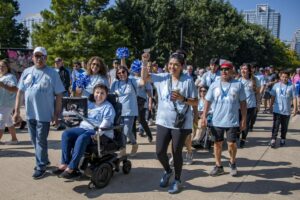We’re Empowering the ALS Community with New Resources and Tools

This month, we’re celebrating ALS Awareness Month by announcing groundbreaking new resources that empower people living with ALS and their families.
Firstly, we’ve released a new guide, ALS & Participation in Clinical Research, designed to provide comprehensive information and support for those considering involvement in clinical trials. This guide aims to demystify the research process and help people make informed decisions about whether participation is right for them.
We’ve also introduced the new My ALS Decision Tool™ on Genetic Counseling and Testing for Family Members. This module offers valuable insights and guidance for families navigating genetic aspects of ALS, helping them make informed choices about genetic testing and counseling
Throughout ALS Awareness Month, please join us in raising awareness and supporting the ALS community. Whether it’s sharing information on social media, participating in an event, or engaging in fundraising activities, every action counts.

The Les Turner ALS Center at Northwestern Medicine is dedicated to bringing new ideas and insights into the field of ALS research. At Northwestern University’s Feinberg School of Medicine, Prof. Navdeep Chandel is an expert in mitochondria, which generate the energy needed to power the cell’s biochemical reactions. Chandel wondered whether cellular metabolism dysfunction could be a driver of ALS or just a symptom of it.
To find out, he set out to work with Evangelos Kiskinis at the Les Turner ALS Center to define how this metabolism changes within the motor neurons of people living with ALS. Armed with a grant from the Les Turner ALS Foundation, the pair began to work with Kiskinis’s induced pluripotent stem cell (iPSC) platform. These stem cells, derived from blood samples of people living with ALS patients, allow researchers to study motor neurons in detail to better understand why and how they die in ALS.
Robert Kalb, the center’s director, said research like this brings a new lens to the disease. “This team is studying two key aspects of cellular operations — how energy is produced and how damaged proteins are disposed of. Both of these processes are known to go awry in ALS,” he said. “Using human cells converted into motor neurons will bring a fresh perspective on what goes wrong in ALS.”

An ALS diagnosis can change someone’s life overnight, and stepping into the role of a caregiver is a journey that comes with its own challenges and rewards. It’s natural to feel overwhelmed, but understanding a few key aspects can help you navigate this new role and prevent burnout.
Our new article, “5 Things to Know for New ALS Caregivers,” offers essential insights for those new to caregiving. From managing your own well-being to involving children in caregiving tasks, and maintaining intimacy in your relationship, these tips are designed to support you through this demanding yet rewarding journey. You’ll also learn about the importance of seeking help and connecting with other caregivers for mutual support.

Bring your friends and family to these thrilling day games, starting at 1:15 PM, with optional tailgating featuring light snacks and drinks before the game. This year, we’re partnering with I AM ALS, ALS United, and the Muscular Dystrophy Association.
Join Us for the End the Legacy Summit

- Connection: Meet and connect with others affected by Genetic ALS & FTD, creating valuable bonds and sharing experiences.
- NEALS Training: Learn from top research clinicians and become a NEALS Research Ambassador through the Clinical Research Learning Institute Curriculum.
- Skill Building: Attend panels focused on patient advocacy, including lessons from other patient movements, family communication about shared risks, and storytelling for different audiences.


